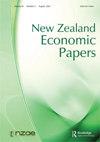{"title":"住房公平与退休家庭消费:来自新加坡人寿保险委员会的证据©","authors":"Lipeng Chen, Liang Jiang, S. Phang, Jun Yu","doi":"10.1080/00779954.2020.1842794","DOIUrl":null,"url":null,"abstract":"ABSTRACT Housing affordability for elderly homeowners involves an entirely different set of issues as compared to housing affordability for first-time homeowners. To afford to ‘age-in-place’ may require homeowners to access channels that enable them to withdraw their housing equity to finance consumption in retirement. We utilize data from the Singapore Life Panel© survey to empirically investigate the impact of housing equity on the consumption of elderly households. Based on panel analysis, we find housing equity value has no significant impact on non-durable consumption for elderly people. The conclusion holds for a battery of robustness checks. Moreover, heterogeneity analyses based on subsamples by the health condition, the age of household head, the house type, and the number of properties owned also show no significant impact of housing equity on consumption. Finally, we use scenario analysis to study the Lease Buyback Scheme (LBS), a novel housing equity monetization scheme that allows elderly households to unlock housing equity for retirement financing. An individual scenario analysis reveals positive but negligible effects, which may explain the low take-up rate for the LBS.","PeriodicalId":38921,"journal":{"name":"New Zealand Economic Papers","volume":"55 1","pages":"124 - 140"},"PeriodicalIF":0.8000,"publicationDate":"2020-11-11","publicationTypes":"Journal Article","fieldsOfStudy":null,"isOpenAccess":false,"openAccessPdf":"https://sci-hub-pdf.com/10.1080/00779954.2020.1842794","citationCount":"3","resultStr":"{\"title\":\"Housing equity and household consumption in retirement: evidence from the Singapore Life Panel©\",\"authors\":\"Lipeng Chen, Liang Jiang, S. Phang, Jun Yu\",\"doi\":\"10.1080/00779954.2020.1842794\",\"DOIUrl\":null,\"url\":null,\"abstract\":\"ABSTRACT Housing affordability for elderly homeowners involves an entirely different set of issues as compared to housing affordability for first-time homeowners. To afford to ‘age-in-place’ may require homeowners to access channels that enable them to withdraw their housing equity to finance consumption in retirement. We utilize data from the Singapore Life Panel© survey to empirically investigate the impact of housing equity on the consumption of elderly households. Based on panel analysis, we find housing equity value has no significant impact on non-durable consumption for elderly people. The conclusion holds for a battery of robustness checks. Moreover, heterogeneity analyses based on subsamples by the health condition, the age of household head, the house type, and the number of properties owned also show no significant impact of housing equity on consumption. Finally, we use scenario analysis to study the Lease Buyback Scheme (LBS), a novel housing equity monetization scheme that allows elderly households to unlock housing equity for retirement financing. An individual scenario analysis reveals positive but negligible effects, which may explain the low take-up rate for the LBS.\",\"PeriodicalId\":38921,\"journal\":{\"name\":\"New Zealand Economic Papers\",\"volume\":\"55 1\",\"pages\":\"124 - 140\"},\"PeriodicalIF\":0.8000,\"publicationDate\":\"2020-11-11\",\"publicationTypes\":\"Journal Article\",\"fieldsOfStudy\":null,\"isOpenAccess\":false,\"openAccessPdf\":\"https://sci-hub-pdf.com/10.1080/00779954.2020.1842794\",\"citationCount\":\"3\",\"resultStr\":null,\"platform\":\"Semanticscholar\",\"paperid\":null,\"PeriodicalName\":\"New Zealand Economic Papers\",\"FirstCategoryId\":\"1085\",\"ListUrlMain\":\"https://doi.org/10.1080/00779954.2020.1842794\",\"RegionNum\":0,\"RegionCategory\":null,\"ArticlePicture\":[],\"TitleCN\":null,\"AbstractTextCN\":null,\"PMCID\":null,\"EPubDate\":\"\",\"PubModel\":\"\",\"JCR\":\"Q3\",\"JCRName\":\"ECONOMICS\",\"Score\":null,\"Total\":0}","platform":"Semanticscholar","paperid":null,"PeriodicalName":"New Zealand Economic Papers","FirstCategoryId":"1085","ListUrlMain":"https://doi.org/10.1080/00779954.2020.1842794","RegionNum":0,"RegionCategory":null,"ArticlePicture":[],"TitleCN":null,"AbstractTextCN":null,"PMCID":null,"EPubDate":"","PubModel":"","JCR":"Q3","JCRName":"ECONOMICS","Score":null,"Total":0}
引用次数: 3
Housing equity and household consumption in retirement: evidence from the Singapore Life Panel©
ABSTRACT Housing affordability for elderly homeowners involves an entirely different set of issues as compared to housing affordability for first-time homeowners. To afford to ‘age-in-place’ may require homeowners to access channels that enable them to withdraw their housing equity to finance consumption in retirement. We utilize data from the Singapore Life Panel© survey to empirically investigate the impact of housing equity on the consumption of elderly households. Based on panel analysis, we find housing equity value has no significant impact on non-durable consumption for elderly people. The conclusion holds for a battery of robustness checks. Moreover, heterogeneity analyses based on subsamples by the health condition, the age of household head, the house type, and the number of properties owned also show no significant impact of housing equity on consumption. Finally, we use scenario analysis to study the Lease Buyback Scheme (LBS), a novel housing equity monetization scheme that allows elderly households to unlock housing equity for retirement financing. An individual scenario analysis reveals positive but negligible effects, which may explain the low take-up rate for the LBS.


